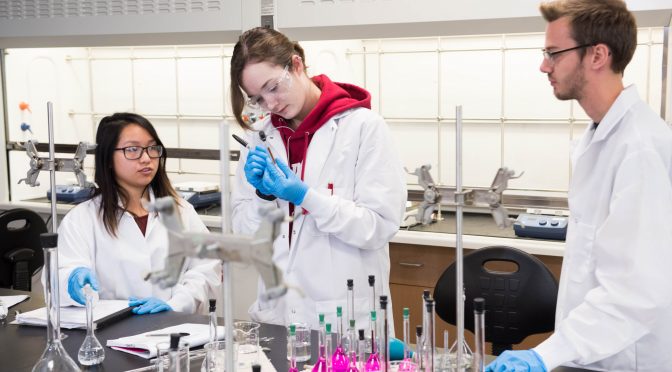Volunteer Kansas has awarded Newman University a $5,000 grant to launch a brand new science and math mentorship program. This funding will also help facilitate Newman’s first White Coat Ceremony Jan. 18, 2018.
The mentorship program, which will be initiated during the spring 2018 semester, will consist of current junior and senior students mentoring younger or newer students in science and math courses outside of class. The mentors will be driven by three main goals: reviewing material already covered in class, previewing material in upcoming lectures and labs and lastly, to stimulate exam questions by quizzing students on material they should already know.
Associate Professor of Biology Michael Bradley said, “Because juniors would be more intimately engaging and interacting with these younger students, these younger students would feel more connected to the community of our science majors.”
The focus on interaction is something faculty at Newman believe will increase retention within the math and science programs, giving newer students more confidence while helping them to be successful in their higher education journey and to stay connected with their peers.
Dean of Arts and Sciences David Shubert suggested that successful science students could be awarded a white lab coat during a ceremony similar to those performed at professional schools.
“Science majors who make it to their junior year would be invited to a white coat ceremony and be recognized,” explained Bradley, “with the explicit understanding that they might be selected to act as mentors for the freshmen and sophomore students from that point on.”
Bradley added he has noticed volunteer mentoring already taking place on a small scale.
Identifying which students will be chosen as mentors will be the responsibility of faculty, and study sessions would be arranged for the mentoring to take place. Study sessions would also benefit radiologic technology and nursing majors as well.
The mentorship program provides a formal process for students to work together and also receive service hours for doing so.
“We, as a group, can’t think of many more appropriate uses of such hours than acting as support mechanisms for struggling students during their first couple of years of college,” said Bradley. “I’ve witnessed individual and voluntary acts of mentoring, which made literally life-changing differences in the performance of struggling students.”

